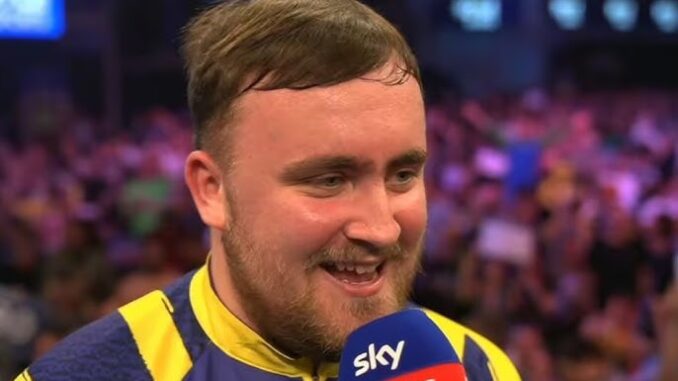
Eighteen-year-old darts phenom Luke Littler has once again grabbed headlines – but not just for his lightning-fast checkout or major win. The Warrington native’s post-match remarks following his dominant 3-0 defeat of former world champion Mike De Decker at the latest edition of the World Grand Prix in Leicester have sparked criticism from within the darts world, with some saying the comments crossed a line.
Littler, fresh off clinching the title and the £120,000 top prize, described the match in blunt terms. “Mike didn’t play his best so I had to jump on it and lead early,” he said. He went on: “Mike didn’t play his best there and I just had to plod along. It was a bit boring at times because I expected something from the reigning champion and I just had to do a job. … He’s going to match me, but Mike just didn’t show up there.”
While Littler’s victory was emphatic and left little doubt about his form, his characterisation of De Decker’s performance — and implying it lacked value because of the opponent’s sub-par display — rubbed some fellow professionals the wrong way. Former PDC Tour stalwart Vincent van der Voort delivered perhaps the most pointed rebuke. Speaking on the Darts Draait Door podcast, he remarked: “That’s just a tap on the chin you give someone like De Decker. You don’t have to say that. It’s inappropriate and not very respectful.” He added further: “At the Grand Slam, Littler actually needed the crowd to beat De Decker … and then to make comments like that about someone who won a tournament just last year – putting him down like that – I don’t like it.” Nonetheless, van der Voort also conceded that the comments “add a bit of spice” to future meetings between the two.
The entire sequence of events paints a portrait of Littler that is equal parts brilliance and raw youth. On one hand, he has shown himself to be a generational talent: in Leicester he steam-rolled one of the major names in the sport, turned in clinical stats and claimed another big trophy. On the other hand, his choice of words signals a player still finding his feet when it comes to managing the optics that come with elite success — especially in a sport with strong traditions of respect among competitors.
The controversy rolled on. Littler drew further scrutiny for his decision to enter the World Youth Championship (open to players aged 24 and under) immediately after lifting the Grand Prix title. Some fans and commentators questioned whether “the Nuke” should have taken a breather, or whether entering a lower-age event was appropriate given his recent major triumph. Littler responded to critics bluntly: “The likes of Gian van Veen, tour-card holder, Keane Barry, tour-card holder — they were all there, but I’m the one who gets it in the neck.” He noted: “I didn’t win so obviously a lot of people were happy.”
Despite the questioning, the youngster bounced back — winning Players Championship 32 and securing his place for the forthcoming Players Championship Finals. But the incident with De Decker remains a talking point: how a champion speaks about a rival reflects not just on his personality but on his place in the professional community, a place Littler is rapidly making his own.
From a broader perspective, the episode highlights a tension intrinsic to sport: when a rising star becomes dominant, there’s the hype and the spectacle — and then there’s the expectation of humility and honouring the greats who came before. Littler’s win in Leicester added to his growing résumé; his comments afterwards reminded everyone that, though he is world champion material, he is still very much a teenager finding his voice.
In the weeks ahead, all eyes will be on how Littler responds. Will he temper his phrasing, perhaps issue a clarification or apology, or simply let his darts do the talking? Meanwhile, De Decker, 29 and former Grand Prix champion, may well respond not with words but with performance should the two cross paths again. The “spice” van der Voort referenced might turn into genuine rivalry.
Ultimately, this is not just a story about one match or one comment — it’s about the evolving dynamics of a sport in transition. Littler is already among the elite, but how he carries his success off the oche may define his legacy even more than what he does on it.
Leave a Reply